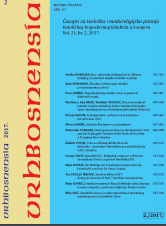NARAVNA SRODNOST“ IZMEĐU ČOVJEKA I ISTINSKOG DOBRA. SUODNOS KRŠĆANSKE VJERE I MORALNOG ŽIVOTA U TEOLOŠKOJ MISLI ANDRIJE ŽIVKOVIĆA
THE „NATURAL KINSHIP“ BETWEEN MAN AND TRUE GOOD. THE RELATIONSHIP BETWEEN CHRISTIAN BELIEF AND MORAL LIFE IN THE THEOLOGICAL THOUGHT OF ANDRIJA ŽIVKOVIĆ
Author(s): Martina s. Ana Begić, Vladimir DugalićContributor(s): Kevin Sullivan (Translator)
Subject(s): Christian Theology and Religion, Ethics / Practical Philosophy, Recent History (1900 till today), Theology and Religion, 19th Century
Published by: Katolički bogoslovni fakultet
Keywords: Andrija Živković; faith; iniquity; morality; truth; revelation; grace; reason; knowledge; free will; freedom; virtuous life;
Summary/Abstract: This paper examines the relationship between Christian belief and moral life in the works of Mgr. dr. sc. Andrija Živković (1886-1957). By studying the first two volumes of Catholic Moral Theology (1938-1942) and comparing them with the revised but unpublished manuscripts of the first (1948) and second volume (1954), as well as analyzing several minor unpublished works preserved in archival material, the authors conclude that Živkovic is, mainly, loyal to the neo-Thomism of the First Vatican Council. Namely, our life and action can only be governed by the purpose that has its source and foundation in the Absolute, so, Živković views faith as cognition of man’s truth about himself which defines his actions. The act of faith presupposes an attitude of humility and obedience, since in most cases religious truths contain discoveries of a sort that the human mind would never come to know on its own, since it is only able to express and infer truths of the natural order. Iniquity, as an act of pride, distances man and society from God, that is, from the knowledge of our supernatural purpose in life and the true good. However, especially in later works, Živković nevertheless makes a certain departure from the purely objective morality of duty towards the moral virtue that is rooted in personal deliberation and will. Faith is the act of commitment of a free individual; it promotes the will towards the truth, to a good and virtuous life. Relying on the thought of St. Thomas, Živković notices a certain “natural kinship” between man and true good, but points out that no created being can be permanently affirmed in the good by their own nature, but only through the faith and grace of God. Faith is consistent with a supernatural virtue that provides the necessary prerequisite for a virtuous Christian life because moral practice follows from faith. Emphasizing the importance of free will in determining the intent and motives of action, Živković approaches in a particular way contemporary theological and moral considerations that emphasize that the purpose of moral life is not only directed towards duties and moral actions but towards the person, to the realization of one’s own existence and one’s self
Journal: Vrhbosnensia
- Issue Year: 2017
- Issue No: 2
- Page Range: 409-438
- Page Count: 30
- Language: Croatian

